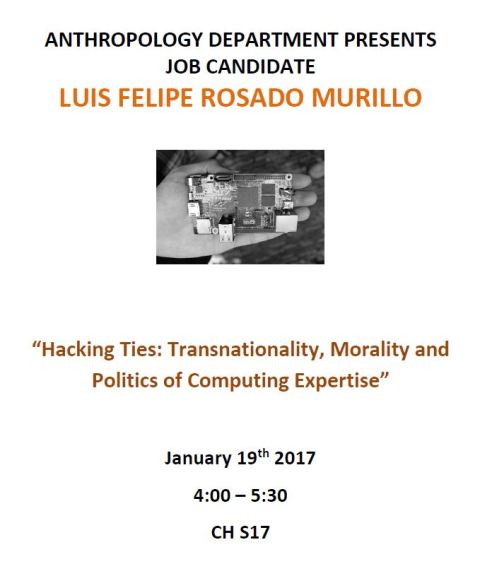
Archive for Lecture & Film Series
AAA 2017 Undergraduate Poster Session ~ Invitation
First Rites: Innovative Undergraduate Research in Anthropology
Abstract: Undergraduate students are an increasingly important element in the production of anthropological knowledge. In its best form, undergraduate research can be seen as an apprenticeship, wherein the novitiate is granted a partnership and some degree of agency in pushing the boundaries of and crossing into new frontiers of shared knowledge. Collaboration with undergraduate students in research is one of the important ways we can facilitate innovation within our discipline. Their research breaks down classroom/research boundaries, focuses on the importance of experiential learning, and exploits the naiveté and vigor of students not yet indoctrinated into paradigmatic complacency. Undergraduate students can be agents and partners in reshaping the landscape of anthropology. The importance of undergraduate research and scholarly activity is underscored both in financial support by federal-level agencies, such as the National Science Foundation, National Endowment for the Humanities, and the National Institutes of Health, and the growing number of faculty-student collaborations in anthropology departments across the globe. Through their engagement, undergraduate students challenge current boundaries and present their findings in the inter-disciplinary medium of visual posters to enrich anthropological inquiry into the human experience.
Students are especially encouraged to present on topics that link to this year’s theme of “Anthropology Matters!” for describing the past, exploring the present, predicting the future, and navigating the processes of being and becoming human.
This session is generously sponsored by the Society for Visual Anthropology. Students are encouraged to highlight both their work and their visual acumen via research posters of their projects. The SVA will evaluate all entries in this session and recognize exemplary posters – that is, those that maximize the possibilities of the format – with a prize.
Interested students must
(1) Become a student member of the AAA, if they are not already.
(2) Register for the conference
http://www.americananthro.org/AttendEvents/Content.aspx?ItemNumber=1697&navItemNumber=69.
(3) Contact me at drotman@nd.edu with an expression of interest. I will add the student to our participant roster and the online registration system will send her/him/them a link for uploading their abstract, etc.
The deadline for submission is Friday, April 14 at 5 pm. Please have your students contact me well in advance of the deadline so they have time to complete all necessary steps before closing.
Peer Review Seminar (Systems Science – open to public)
PRESENTATION TITLE: Demystifying the Peer-Reviewed Publication Process
DATE: Friday, February 24th, 2017, 12:00 – 1:00 PM
LOCATION: Harder House, Room 104
PRESENTER: Dora Raymaker
SUMMARY: The business of peer-reviewed publication can seem complex and daunting. This seminar breaks down the parts and shares examples of the process from both an author and a peer-reviewer perspective. I’ll cover:
1. How to identify publishable papers and which journals to send them to
2. Writing and admin tips to enhance your chances of a favorable review
3. Walking through the process of seeking publication from start to finish
4. …including What to expect from reviewers and how to address reviewer comments and rejections
5. How to get involved as a peer reviewer, and why it benefits both you and science
6. Walking through the process of conducting peer review
7. Post-publication—getting your work known about and read
I’ll bring juicy samples! And answer as many of your questions as I can.
BIO: Dora Raymaker, PhD is an Assistant Research Professor at the Portland State University’s Regional Research Institute and co-directs the Academic Autism Spectrum Partnership in Research and Education (AASPIRE, http://aaspire.org). She is an intervention researcher with particular interest in community-engaged practices, accessible technology, measurement adaptation and knowledge translation, and dynamics at the intersection of science, society, and public policy. Dr. Raymaker primarily conducts research in collaboration with disability communities. She has been publishing papers and book chapters since her early student days in the Systems Science program, and is a peer reviewer for a number of journals.
REMOTE PARTICIPATION:
https://us.bbcollab.com/guest/5FC1B716B810E706ABD02F9A4AB07E0D
February First Thursday Talks- Feb. 2 and Feb. 9!
This month, we will be hosting TWO First Thursday events!


Dr. Murillo – Job talk Thurs Jan 19 and student lunch Fri Jan 20th
Please join us for a talk entitled “Hacking Ties: transnationality, morality and politics of computing expertise” by Dr. Luis Felipe Rosado Murillo. The talk will be held in Cramer Hall sub-basement room S-17 at 4:00 PM on Thursday, January 19th. Dr. Murillo is a finalist for the open position in applied socio-cultural anthropology.
Students are welcome to meet Dr. Murillo for a deli lunch at noon on Friday, January 20th in the Anthropology Department lounge (CH 141).
First Thursday: “Early Holocene Archaeology of Oregon’s Harney Basin”
“Early Holocene Archaeology of Oregon’s Harney Basin”
Presented by Danny Gilmour & Erik Hardman
Willamette Cultural Resources Associates, Ltd
Thursday, October 6
4:00pm, Smith Memorial Ctr 236
Free & Open to Public
Oregon’s Harney Basin lies at the margin of the northern Great Basin and the southern Columbia Plateau. Paleoindian sites are known in the area, but typically consist of surface scatters of stemmed and occasionally fluted points found scattered across both lowland and upland settings. Few sites have undergone extensive excavation. In this paper, we present results of recent archaeological investigations and integrate this information with existing excavation data to increase our understanding of early human use of the area. The data provide insights to the complexity of adaptations practiced by foraging groups as they responded to the shifting environmental conditions of the early Holocene and the shrinking of pluvial Lake Malheur.






